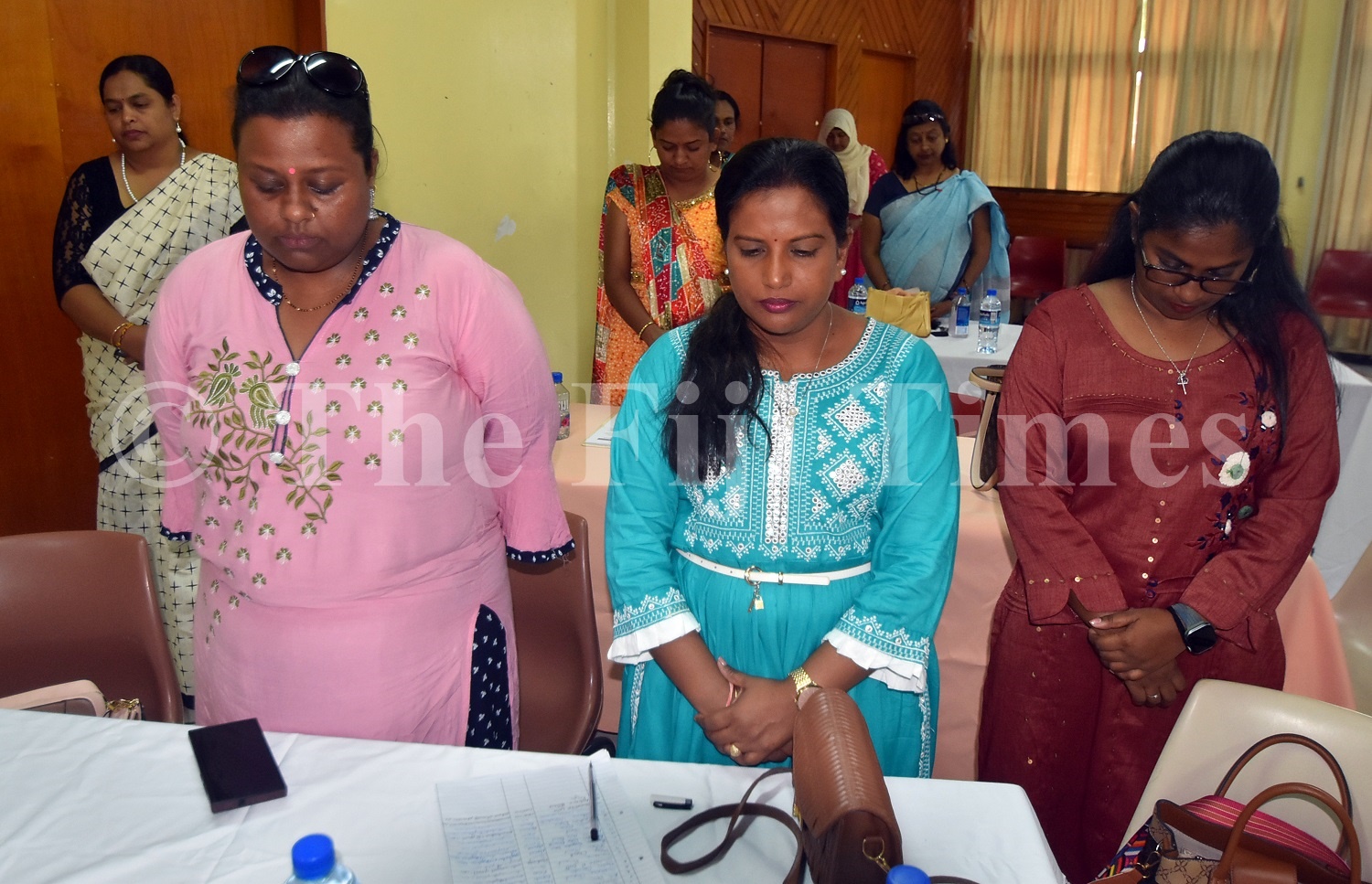Over the next few days up until December 10, Human Rights Day, women’s organisations around the world will amplify messages around what is internationally known as the 16 Days of Women teachers observe a moment of silence at the Activism against Gender-Based Violence.
In Fiji and the Pacific, this annual campaign over the years has not only focused on violence against women and girls as a human rights issue but has also played a huge role in demanding from leaders and government good governance, respect for the rule of law and the principles of justice and fairness.
Every year the 16 days give us the opportunity to reassess ourselves as a society of people and ask whether we have done enough to address some of the most despicable issues we hear and see almost on a daily basis. NGOs, activists and human rights watchdogs continue to harp about domestic violence all year round.
There is ongoing outrage over the rape and sexual assault committed against women and children.
In our homes, where love and respect is supposed to be in abundance, women, girls and children are being victimised and grossly violated.
One thing is clear – a majority of sex-based crimes are committed by men closely related to the victims and many of them are the victims’ own fathers, cousins, husbands, partners, uncles and grandfathers.
Alarming is the regular statistics released by the police and the office of the director of public prosecutions.
As we go through this new month, leading up to Christmas and New Years it might be relevant to remember those women and girls who lost their lives through violence and those who continue to go through a living hell.
The history behind the 16 days of activism, which started on November 25 and ends on December 10 needs to be shared. According to some historical records, back in 1960, sisters Patria, Minerva and Maria Teresa Mirabal, three political activists who actively opposed the cruelty and violence of the Trujillo dictatorship in the Dominican Republic, were clubbed to death and dumped at the bottom of a cliff by Trujillo’s secret police.
Since then, the Mirabal sisters have become international symbols of the feminist resistance, and in commemoration of their deaths, November 25 was declared International Day for the Elimination of Violence against Women in Latin America in 1980.
Later, this international day was formally recognised by the United Nations in 1999.
In June 1991, the Centre for Women’s Global Leadership (CWGL), alongside participants of the first Women’s Global Institute on Women, Violence and Human Rights, called for a global campaign of 16 Days of Activism Against GenderBased Violence.
The 16 days begins with the International Day for the Elimination of Violence Against Women and ends with International Human Rights Day on December 10 – highlighting that violence against women is a fundamental violation of human rights.
Last week, on November 25, UN SecretaryGeneral António Guterres declared violence against women as a “horrific violation of human rights, a public health crisis, and a major obstacle to sustainable development”.
“We still live in a male-dominated culture that leaves women vulnerable by denying them equality in dignity and rights,” stated Mr Guterres, underscoring the far-reaching consequences of such a culture on societies, economies, and global justice.
He stressed that creating a different world is not only necessary but also possible.
Mr Guterres announced this year’s theme of the UNiTE campaign as “Invest to Prevent Violence against Women & Girls,” calling on individuals, communities, and nations to take decisive action.
The campaign encourages support for legislation and comprehensive policies that strengthen the protection of women’s rights across the board.
To address the issue at its core, Mr Guterres urged the international community to ramp up investments in prevention and support to women’s rights organisations.
Our alarming and shameful statistics plus campaign messages from our women and women’s organisations over the next few days should remind us of our duty to keep up the fight.
Sweeping domestic violence issues under the carpet and hiding behind a veil of ignorance will not solve them. Violence against all groupings of women and girls, in whatever form, will not dissipate on its own.
It is a man-made problem and therefore we must look within us and find ambitious ways of addressing it.
Everyone must participate, especially men – as partners in the fight. I believe that despite the shocking statistics stacked against us, we still have hope. We must grasp every opportunity to reverse the trend and have a fervent resolve and determination to tackle it using the political will of our leaders, the guidance and values of our religions, our Pacific culture of respect and the goodwill of our communities and citizens.
Whether we see and hear awareness campaigns in towns, schools, villages or city streets, let us band together and canvass support for our women, our mothers, our sisters, our daughters and aunts, our nieces and our granddaughters.
We must take time out to salute all those who have fought tirelessly over the past decades to bring about the changes we now see and feel but we must not end there.
Let’s continue to denounce any act of violence we come across in our neighbourhood, talk openly about it in our families, and change the script on things that have perpetuated and somewhat immortalised gender based violence.
While we have progressed in leaps and bounds, we must recognise that many voices are still silenced, many cries remain unheard, many concerns are still overlooked and many remain unreached.
It is for those still trapped and dragged down by these struggles and acts of cruelty that we must continue to fight for. Turning a blind eye will only cause our own detriment. Until we meet again on this same page same time next week, stay blessed, stay healthy and stay safe!



